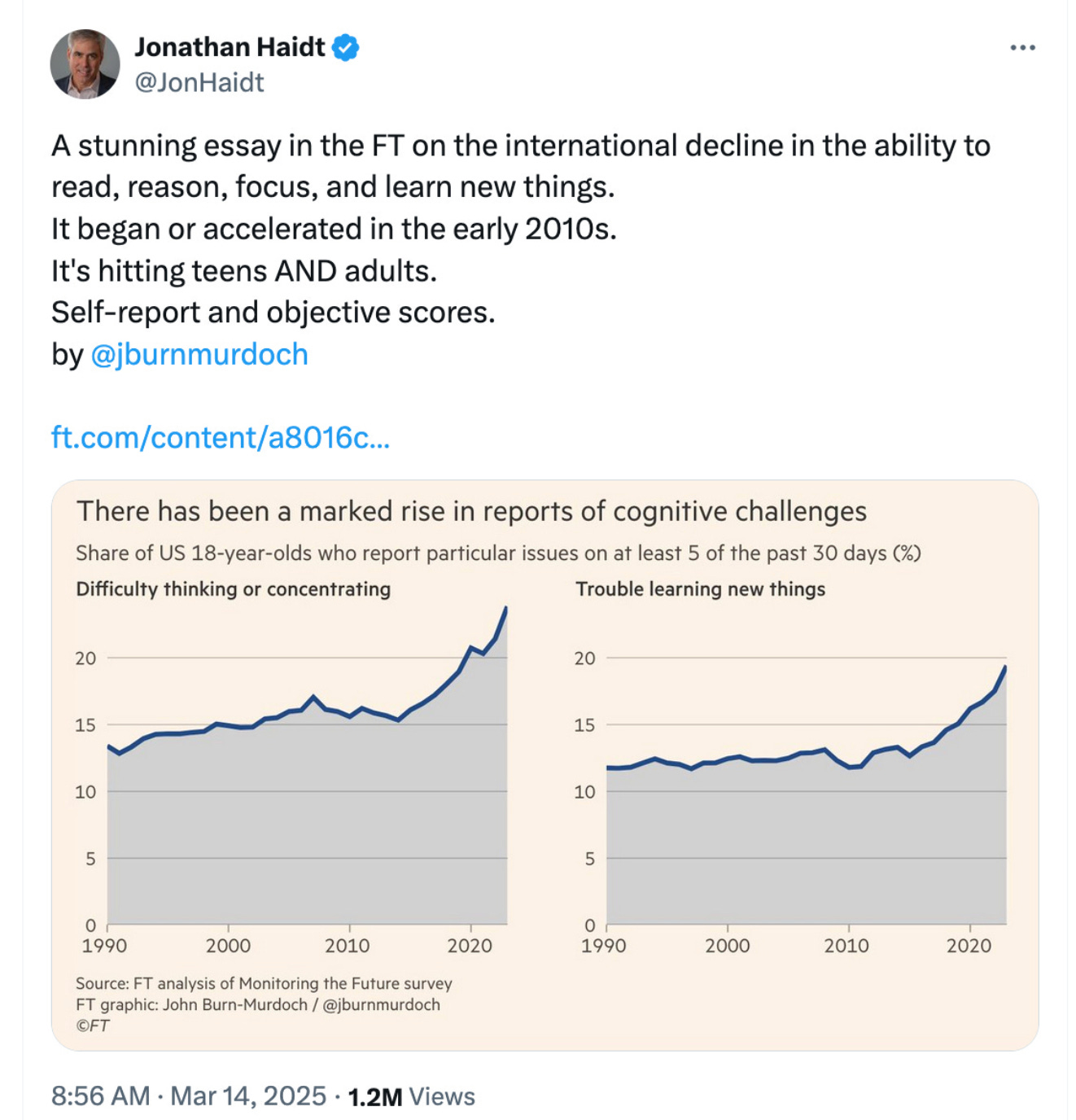The Adolescent Digital Detox
Cutting screen-time won't fix your kid immediately. It's going to take time and effort, but it might just be the most important thing you do as a parent.
So you did it, mom and dad. You did the very hard thing. You saw how screens were affecting your kid so you cut them way back. You may have eliminated them altogether.
Okay. But why are his grades still not moving much? Why are you still getting emails that he's not following instructions in class? Why is he struggling to pay attention? Why does it still take him hours to finish homework even though you've removed all distractions? Why are there still assignments marked "missing" in the online gradebook? Why are his quiz and test grades still low? He doesn't have unlimited access to a smartphone anymore and the computer and gaming systems are locked down. What's going on?
The insidious thing about the technology hijacking your kid's brain is that dopamine isn't a drug you can just remove; it's a neurotransmitter essential to brain function. The process you've begun is the reset of an overstimulated reward system. How long will it take to get a kid back to tracking mud through your house thoughtlessly, attempting stunts that result in semi-serious injury, not coming home when he's supposed to, being mocked by his friends into finally saying "Hi" to that sweet girl down the street, and being able to focus his attention on an academic task for 30ish minutes? Well, that all depends on factors like his age, how heavy and frequent his screen-use was, and how overstimulated he was by what he was seeing on-screen.
I have a few students who I know have been cut off from screens and, though they are improving, the progress is slow. It seems as though their brains can make the connections, just with a significant delay. These students are quiet, subdued. They appear to be listening, but I have to frequently redirect their attention back to the task at hand. Once I do, they go glassy-eyed frighteningly fast.
That cycle of instant gratification your child has become accustomed to has to be broken. The good news is you've seen the danger and begun to moderate it. Though research suggests the brain will start adapting to decreased screen-time within days, meaningful changes for a heavy user often take months. That means if your child has been permitted unlimited or heavy screen-time, this process might take a while; if you take a look at this tweet from @jonathanhaidt below, you'll see why it's vital that you hold the line.
Practically, what you're trying to effect, parents, is not a full dopamine detox but a rebalancing of dopamine delivery to healthier frequencies in response to real stimuli,, not the hyper-frequent delivery purposefully engineered to keep your kids locked in on screens to earn somebody else a ton of profit. Dopamine shouldn't come as frequently as social media, Shorts/Reels, and gaming deliver it; you and your kids must fight to rejigger it.
What can you do to see change sooner?
Encourage replacement activities. Get him outside mountain biking, hiking, walking the dog, mowing the lawn or digging a ditch. Spending time outside with friends— without phones or screens— is probably the healthiest thing for your child. It's self-reinforcing because humans are social creatures; being with others, smiling, laughing, and working together to solve problems comes with loads of neurochemical reinforcement (oxytocin, serotonin, and dopamine) plus kids just see this as fun. Friends plus physical activity speed up dopamine rebalancing. Exercise boosts dopamine too, so if your kid wants to hit the gym or do some plyo or go for a bike ride with you, go.
Please say “Yes” when your kid asks, “Hey dad, you wanna have a catch?”
Consistency matters more than duration in this process of de-screenifying. You mustn't let him go back to his old habits just because you see a grade go up or aan improvement in behavior. If you do let him run back to his phone or the iPad or the gaming system, you are undoing your hard work and his. This summer may be the most difficult three months of your life, but if you let him rejoin the pretend-worlds he's lived in so long, you're either going to have to give up the goal or grind through this process all over again, only next time your kid will take you less seriously.
This process requires strict discipline and heavy exertion. You're affecting much more than his neurochemical balance. You're building self-discipline, perseverance, mental toughness, and probably, most importantly: courage. Your son's confidence will explode when he sees he can beat an addiction that most of his friends have tried to break, but can't because they and their parents aren't knowledgeable about its long-term effects or tough enough to grind it out.
He will also grow as he gets out to do real things in the real world, just like this young man did when his mom let him go into a Chik-Fil-A and order a meal for himself unaccompanied.
A Few Caveats
There are two things I want you to be aware of as you continue this process:
Minimizing screen time can be very lonely. If your son or daughter is VeryMuchOnline, all of her friends are too. She may ask them to go do things, and they may consistently refuse because they prefer to remain online — it's easy and their parents believe it's safer. You're also going to run into the wall of parents who think playing outside is dangerous and requires full adult supervision at all times. You may have to reach out to other parents on your child's behalf to find families willing to do this work on behalf of their children.
Your kid is going to whine a lot about being bored. Resist the desire to intervene. Boredom helps children develop valuable planning, organizational, and problem-solving skills. Crucially, boredom teaches them maybe the most important lesson too many under-30 don't know: the world doesn't revolve around them. You can learn some practical ways to help your child respond to boredom here:
Finally, we need to reckon with the fact that we can feel like hypocrites in trying to minimize screen time because many of us parents are also self-soothing with screens. We often spend our days staring at monitors for work and many of us turn to our smartphone screens for distraction from the stresses of modern life. We may be avoiding necessary shepherding of our children because we know that limiting or removing screens altogether is going to create conflict (e.g., tantrums, "attitude", sneaking, lying, etc., all requiring additional parental correction) and we know such conflict will add to our stress.
I'll be the first to admit that raising kids in the digital age is not easy, but I've experienced several thousand students-worth of what screen-time does to teenagers. I did everything I could, including resigning from what most outside observers would class as a great job, to prevent seeing those things happen to my own children.
I hope this article encourages you to continue on as Epictetus recommended: "Give yourself fully to your endeavors. Decide to construct your character through excellent actions and determine to pay the price of a worthy goal. The trials you encounter will introduce you to your strengths.”
On a final, somewhat personal note many of you may empathize with: I would've been a lonesome kid too if not for books. I was never bored because I always could find people to spend time with: the truly great people in books. Maybe it's time to get your son and daughter to look Greatness in the face so they'll be ready to grasp it for themselves when the opportunity arrives. They'll find the examples of great men and women and so much more wisdom in books. Here’s a list I made for your children in hopes that they will venture widely:
Books to Build Great Americans (Ages 13-17)
These are the most important books you or your child will ever read.
If you appreciate this and believe that my essays, podcasts, and lesson plans will be useful to American families recovering control of their child’s education (even if they can’t fully control their schooling) please consider subscribing to support my work or buying me a coffee and contributing whatever you can. If you can’t afford to help, know that I intend to provide the most important posts to support you in teaching your own children free of charge.






